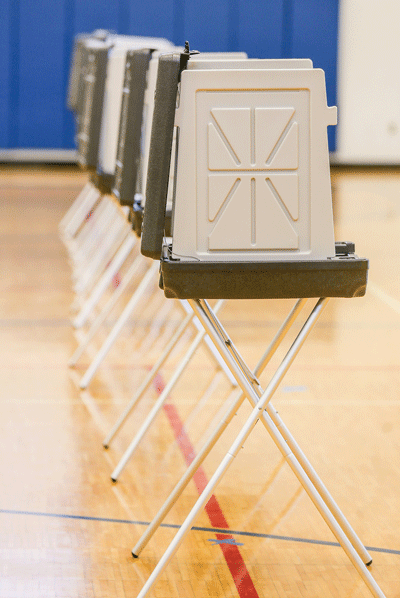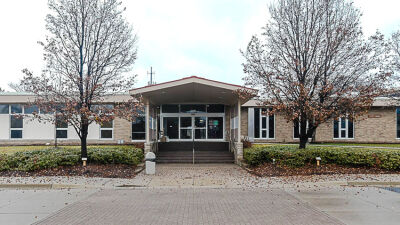MADISON HEIGHTS — This November, Madison Heights residents will vote on five proposals for amendments to the city charter.
Issues include how the mayor pro tem is decided, whether a City Council member can hold office while running for mayor, how resignations are handled, how vacancies are filled on the council, and how often council meetings are held.
“The proposals that most intrigue me are the ones where we can take certain decisions out of the hands of the council — out of politics as usual — and instead put them directly toward the citizens and democracy at play,” said Mayor Pro Tem Mark Bliss. “That’s the thing that excites me the most.”
Proposal 1
Proposal 1 concerns the designation of the mayor pro tem — the council member who fills in for the mayor, when needed. Currently, the mayor and council vote on the matter at their first meeting after a mayoral election.
Proposal 1 would change the rules so that the council member who received the highest number of votes in the last regular city election automatically becomes the mayor pro tem and serves for the next two years.
If approved, Proposal 1 would first take effect during the regular city election in 2025.
Proposal 2
Proposal 2 is about whether the holders of various elected offices can run for elected city offices in Madison Heights.
Currently, if someone already holds elected office for the state, a county or another city, they must first resign from their elected office before running for office in Madison Heights. If a candidate is currently a member of the Madison Heights City Council, they must resign their elected office prior to running for mayor in the city.
If approved, Proposal 2 would allow candidates to remain in their offices while they campaign, and only require them to resign from those offices once they’re elected in Madison Heights.
If approved, Proposal 2 would first take effect during the regular city election in 2025.
Proposal 3
Proposal 3 concerns how resignations are handled.
Currently, when an elected official or an appointed board member resigns, the council must accept or reject the resignation at its meeting.
Proposal 3 would change the rules so that the council only handles resignations for its own members, including the mayor, while the resignations of appointed board members and commission members would be handled by the city’s administrative staff.
If approved, Proposal 3 would go into effect this year.
Proposal 4
Proposal 4 deals with filling vacancies in elected offices.
Currently, when there is a vacancy in the office of mayor, the council votes to appoint one of its members to serve as mayor for the rest of the term. When there is a vacancy among council members, the council appoints a new member at the next meeting after the vacancy occurs, choosing the runner-up from the last regular city election. If there is no runner-up, the council votes on another resident to fill the vacancy.
Under Proposal 4, a vacancy in the office of mayor would instead be filled by the appointment of the mayor pro tem at the council’s next meeting following the vacancy. The vacancy created by the mayor pro tem, in turn, would be filled by the council member who received the second highest number of votes in the last regular city election.
Both the mayor and mayor pro tem would then serve until the next regular city election. Council member vacancies would be handled the same way as they were before.
If approved, the changes would take place during the 2025 regular city election.
Proposal 5
Proposal 5 regards the number of council meetings held throughout the year.
The charter currently requires the council to hold at least two regular meetings each month, except during the month of December, when only one meeting is required, for a total of 23 regular meetings per year.
Under Proposal 5, the council would still be required to hold 23 regular meetings each year, but in order to improve scheduling flexibility, a minimum of only one regular meeting would be required each month.
If approved, Proposal 5 would go into effect this year.
Letting the people decide
Mayor Roslyn Grafstein voted against including the ballot option for Proposal 2 during the council meeting May 22, but voted in favor of the other four. The other council members approved the language for all five proposals, except for Councilwoman Toya Aaron, who was absent.
When asked in an email why she voted against putting Proposal 2 on the ballot, Grafstein said, “It has been years since we have asked our residents to vote on anything like this, and I feel that five proposals at once are too many. My preference would be to see one or two proposals annually at each November election, so that slowly we can make modifications as residents see fit.”
The mayor did note that she personally wants to see Proposal 5 pass so that the council has more flexibility in scheduling meetings, since there are times when the council does not have enough members present to make a quorum. She also wants to see Proposal 3 pass, and said, “If a board member moves or requests to resign from their position, I do not understand why they would need (the City Council’s) permission to do so.”
Aaron did not respond by press time when asked about the ballot language.
Bliss noted how several proposals, if approved, would automate certain decisions about council and mayoral appointments, so that council members don’t have to make those decisions.
“I think any time you can remove political gamesmanship and make a decision based on the intent of the voters, that’s when good government happens,” Bliss said. “That way, officeholders can just focus on doing the jobs they were elected to do.”
Councilmember Quinn Wright said that he supports more scheduling flexibility at meetings out of respect for officials observing different holidays and traditions.
“What excites me even more is that residents will have the final say on these matters,” he said. “I hope there’s record-high turnout in November.”
Councilmember Sean Fleming said he looks forward to voters sharing their input. He then cautioned against changing the requirement for meetings.
“While I voted to approve all five proposals being on the ballot, with regards to meetings, I am not in favor of our city being allowed to have only one meeting on some months — that would leave our residents with potentially a four-week gap where they can’t voice their concerns,” Fleming said.
Councilmember Emily Rohrbach said via email that she’s “thrilled” by the ballot options.
“The changes will make the appointment of the mayor pro tem directly tied to the will of the voters and remove hiccups and political maneuvering that can happen with a newly elected council,” Rohrbach said. “This change will make it simple: the person who gets the highest number of votes in the most recent election is appointed mayor pro tem.
“The other big change would make it so that in the case of a vacancy in the office of mayor, the mayor pro tem would automatically be appointed to fill the vacancy until the next mayoral election,” she said. “Again, this takes the internal maneuvering out of the process, and puts it back into the hands of the voters.”
Councilmember David Soltis said he is pleased to see the options on the ballot.
“I think this is democracy in action,” Soltis said. “A citizens group got together and were debating and discussing it. Now, we’ll leave it up to the voters. I want the people to vote on it, and I want our charter to reflect the will of the people.”
 Publication select ▼
Publication select ▼



























